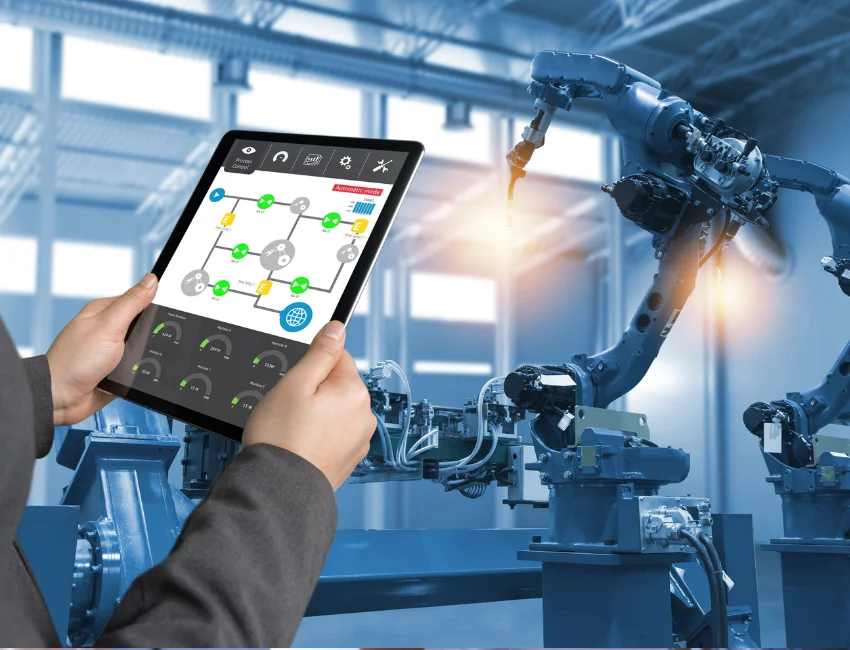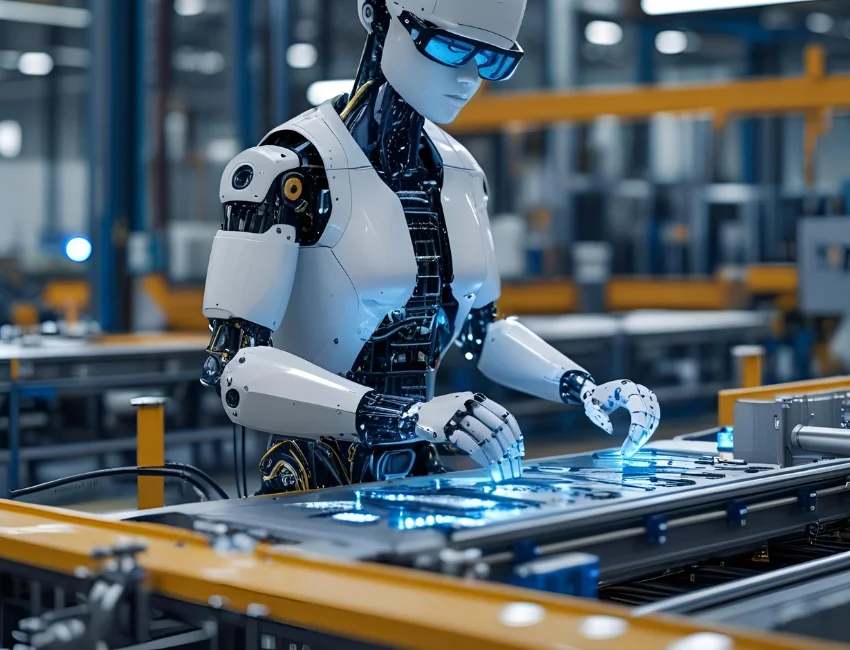

AI in manufacturing examples improves efficiency through predictive maintenance, quality control, and robotic automation. Predictive algorithms reduce downtime by forecasting equipment failure. Computer vision systems detect defects in real-time. AI-powered robots handle repetitive tasks to increase productivity and safety.
The implementation of Artificial Intelligence into manufacturing industries is transforming the operations of factories and production units mechanized systems while progressively optimizing their efficiency, effectiveness, and overall cost efficiency. AI technology is used in many areas such as decision-making and proactive machine failure prediction within the manufacturing model.
Furthermore, companies have access to advanced AI tools that perform self-learning. AI in manufacturing goes beyond the imagination of just using robots. This technology aids small businesses as well as large-scale industrial plants.
In this blog, we will explore the aspects of AI technology integration in the field of manufacturing, explain the technology AI tools work with in manufacturing, and share case studies from around the world that showcase why AI in manufacturing is the future. Let’s begin with knowing the shocking AI in manufacturing examples.
Let’s be honest: the traditional approaches to operating factory floors are going out of style. The integration of AI and manufacturing is tackling issues that are insurmountable when approached by man alone. Take, for example, real-time monitoring, automated quality assurance, and smart forecasting. That is the impact that AI is having in the manufacturing world.
These systems make gigantic datasets that are critically important for decision making, human beings taking days to process this data, into decisions in seconds. This is a revolutionary benefit for businesses facing the challenge of quicker, better, and cheaper production than their competitors. That is not all; AI for manufacturing companies also reduces waste, downtime, human-caused errors, and man hours. All in all, AI is not merely assisting, rather changing completely how manufacturing works.

When we discuss AI and the manufacturing sector, most people picture robots doing monotonous activities. While true, this only tells a fraction of the story because the reality is countless steps ahead – and so much more exciting. AI and manufacturing are currently working together to turn factories into predicting, learning, adapting, and self-sustaining intelligent systems. Here are five ways AI applications in manufacturing are making a tremendous impact.
What if machines could warn you before their parts start breaking? This is precisely what AI for manufacturing does through predictive maintenance. Sensors located on the machine’s parts gather data in real time such as temperature, vibration, and pressure. AI is capable of analyzing this data and predicting when a machine is likely to fail.
This helps technicians to solve problems in advance which helps in saving time and money by reducing downtimes which were not planned. Industries employing this technique have reported savings of almost 50% in maintenance expenses. This is a huge advantage for any manufacturer who wishes to stay ahead in the competitive world because reduction in downtime works in their favor.
Quality control in traditional factories is carried out by human inspectors. AI however speeds the process while improving the accuracy significantly. AI powered cameras and computer vision can scan thousands of products every hour and spot defects that humans do not normally see.
One of the leading electronics corporations in North America adopted AI powered inspection systems which reduced product defects by 30% in less than a year of implementation. Solutions like these not only help improve the quality of goods that are manufactured but also aid in reducing waste which is a major boon for the environment as well as the bottom line.
The manufacturing sector incurs substantial costs when inventory arrives late or remains idle in warehouses. This is where AI comes into play. In the manufacturing sector, AI optimizes inventory and supply chain choices by leveraging data from vendors, sales predictions, and even weather forecasts.
One case in point is a global automaker that employed AI to predict impending shortages and proactively redistribute inventory across regions before bottlenecks occurred. Smart planning of this sort enhances delivery performance while minimizing stockouts and excess inventory. AI does not only support machinery, but it ensures that all aspects of manufacturing operations run seamlessly.
The functions of AI-powered robots have evolved beyond lifting heavy objects. Today’s robots, or cobots, are proficient in collaborating with human employees in close quarters. They utilize computer vision and reinforcement learning to master new skills and can adapt to the changes that take place on the production line.
During seasonal increases in demand, a leading food processor incorporated cobots for packaging. With AI orchestrating the robot’s tasks, the company attained greater efficiency without additional hires. These AI-powered cobots are assisting manufacturing companies scale up operations quickly and securely.
Some contemporary factories are integrated with systems that make autonomous decisions such as modifying machine settings, changing production line paths, and dynamically adjusting workload distribution in real-time. These are some of the applications of AI in manufacturing automation.
Take, for instance, a chemical plant where an AI system supervised the balancing of heat and chemicals in the production process. Whenever an output level was detected to differ from the desired output, it immediately took action to balance the system. This achieved better product uniformity and lower energy expenditure.
These kinds of AI technology incorporate seamless interfaces between AI and the manufacturing processes to facilitate more balanced management interventions toward productivity enhancement, energy saving, and increased operational output. It’s not merely automation—it’s true intelligent manufacturing.
In short, generative AI in manufacturing is turning ideas into tested solutions faster than ever. It’s all about smarter designs, quicker launches, and innovation that’s driven by data. Ai is playing a great role in the market of semi conductors as well.

Every sector stands to benefit from the implementation of AI technologies regardless of the scale — ranging from a single technician workshop to a factory. Problems such as cost-efficiency and precision in operations are now accessible even to smaller businesses because of inclusive and scalable AI technologies. Contrary to popular belief, big enterprises with advanced automation systems in place are not always at the forefront.
Sustained operational savings make up the most powerful benefit. Reduction of AI-driven operations costs stems from a decreased prevalence of hurricanes, breakdowns, and leaner production. Added value comes from less resource spending and a reduction in idle time. Smaller companies that are unable to absorb the cost impacts of prolonged inactivity are most benefitted from predictive maintenance and real-time monitoring.
Increased velocity in decision making is another fascinating outcome. An explosion in available AI tools enables the instantaneous scrutiny of vast amounts of production data. Identification of trends and inefficiencies, as well as formulation of recommendations, has become possible to managers irrespective of size.
Another area where AI excels is improving product quality. With machine learning models and AI-powered quality checks, defects are ensured across batches, achieving consistent results by catching issues at much earlier stages.
Similarly, AI in manufacturing improves visibility along the supply chain, workforce productivity, and even energy efficiency for businesses of all scales. It helps companies remain agile, sustain a lean build, and respond to market demand better than ever. AI manufacturing tools are a seamless fit for factory floors and packaging lines alike, expanding with the business.
Here at WebOsmotic, we are all too familiar with the challenges that manufacturers encounter in this dynamic environment. This is why they work on bringing AI services in manufacturing from the realm of theory to reality. Our AI models are built to be responsive to the needs of the business, be it improving efficiency, reducing downtime, or enhancing the quality control system.
We develop proprietary AI solutions that serve the particular requirements of each client rather than employing ready-made frameworks. Our team guarantees you future-proof results regardless of the scope of your project, be it applications of AI in manufacturing or pushing the boundaries of generative AI in manufacturing. Transforming your factory’s capabilities with advanced, flexible, and robust AI tools crafted by WebOsmotic is the goal.